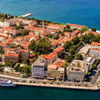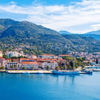Special health situations
Flying during pregnancy
Provided there have been no pregnancy complications, expectant mothers may travel with us until the 36th week of their pregnancy without a doctor's certificate. If you are pregnant with multiple babies, you can fly with Edelweiss up to the end of the 32nd
Our tips for expectant mothers
- Consult your doctor before your flight to preclude any additional risks.
- As of your 29th week of pregnancy, we recommend you bring along a medical certificate (confirming that there are no pregnancy complications, expected date of childbirth).
- Make sure you drink plenty of water before and during the flight.
- Wear compression/support tights to prevent your legs from feeling heavy and to decrease the risk of Deep Vein Thrombosis.
Flying with a cast
You may fly with us if you have an arm or leg plaster cast. We will require that your doctor complete an SAF/MEDIF form (fit to fly/medical clearance form) in the following cases:
- Flights between two and five hours: split casts applied less than 24 hours before the flight; circular casts applied less than 72 hours before the flight
- Flights of more than five hours: split casts applied less than 72 hours before the flight; circular casts applied less than five (5) days before the flight
The SAF/MEDIF form must be completed by the passenger concerned and their attending physician and submitted via the SWISS Special Assistance Portal. A login is required to use the portal. If you do not yet have a Miles & More service card number or Travel ID, you can register for a Travel ID on the portal.
SWISS Special Assistance Portal
If you have any questions or queries, please do not hesitate to contact us at medicalservices@flyedelweiss.com.
Colds and pressure equalisation
As a rule, flying with a cold should not cause any problems. The pressure in our aircraft corresponds to the pressure at an altitude of 2000 m above sea level, meaning that, under normal circumstances, you will hardly notice the difference. If you are suffering from a runny nose and blocked sinuses, we recommend you try the ”Valsalva maneouvre” at home, to see if you can equalise the pressure: close your mouth, gently pinch your nostrils together using your hands and slowly press a small amount of air into the back of your throat. If, when doing so, you can feel pressure in both inner ears, your body is balancing the pressure and flying should not cause any further problems. By contrast, if you do not feel any pressure, or if you only feel it in one ear, you are advised to consult a doctor. In the latter case, it is possible that the change in pressure during descent will damage your ear.
Flying with varicose veins or venous problems
If you have varicose veins or suffer from venous problems, we suggest you wear compression/support stockings. Your doctor may prescribe you blood-thinning medication for the duration of the flight. Make sure you drink plenty of water to stay hydrated, avoid caffeinated drinks, such as coffee and tea, and refrain from drinking alcohol.
Flying with diabetes
We recommend diabetics to consult their doctor about their envisaged flight beforehand. The following questions need to be clarified:
- Will I need to inject insulin during the flight? If so, will I need to have it in my carry-on luggage? In that case, I will need a medical certificate for the security check.
- What type and quantity of insulin injections will I need for my trip?
- What does my injection schedule for the flight and onward travel look like?
- Does my insulin dose need to be increased or reduced, depending on whether I will be travelling west or east?
- What amount of medication and material will I need to take with me?
Medical certificate – necessary or not?
In some cases, it is recommended or imperative to travel with a medical certificate. The following special health situations require that you bring along a medical certificate:
- Pacemakers or metal implants (e.g. artificial joints, metal fixtures for fractures): a medical certificate is chiefly required when passing through the security check.
- Essential medicines and syringes (e.g. for diabetics and passengers suffering from chronic diseases): it is necessary to have a medical certificate that states the diagnosis and required medication.
- For destination countries that require certain vaccinations: it is advisable to travel with a vaccination record or vaccination booklet.
We recommend that you have your medical certificate issued in English – as this may save you time at the various security checks.
Depending on the degree of impairment, we require a medical certificate as well as a SAF/MEDIF form (fitness to travel) completed by your doctor. The SAF/MEDIF form must be completed by the passenger concerned and their attending physician and submitted via the SWISS Special Assistance Portal. A login is required to use the portal. If you do not yet have a Miles & More service card number or Travel ID, you can register for a Travel ID on the portal.
SWISS Special Assistance Portal
If you have any questions or queries, please do not hesitate to contact us at medicalservices@flyedelweiss.com.
Air Travel Not Permitted
Air travel with Edelweiss is not permitted in the following cases.
- Divers whose latest dive was within the last 24 hours (if you developed any problems when resurfacing from any dive, please consult a doctor)
- If you are suffering from an acute cold combined with high fever
- If you have a serious heart or lung condition (e.g. difficulty breathing, if you recently suffered a heart attack, if you have unstable angina pectoris, unstable cardiac insufficiency or pneumothorax)
- If you suffered a stroke recently
- If you are severely anaemic
- If you have an infectious disease
- If you had surgery recently
- In the case of certain acute mental illnesses
Unsure whether you should or are permitted to fly?
We recommend that you discuss your travel plans with your doctor beforehand and clarify all preparations necessary for travel. Book your flight at the latest two days before departure and let us know your wishes by e-mail to medicalservices@flyedelweiss.com.








